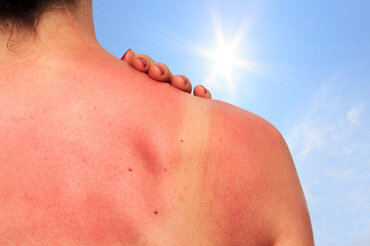Living in Australia we are often bombarded with messages about the dangers of sun exposure. And rightly so, with our high rate of skin cancer (melanoma in particular).
What is sunburn?
Sunburn occurs when your skin, is overexposed to ultraviolet radiation (UVR), even on cool, coudy days it can damage your skin. Your eyes may also be painful or irritated due to overexposure to UVR.
Signs and Symptoms
Sunburns can appear from as little as 11 minutes and can cause your skin to change colour from slightly pink to severely red or purple within 2-6 hours of being burnt. Symptoms will continue to develop for the next 24-72 hours and depending on severity can take days or weeks to heal.
You may experience the following symptoms:
- Blistered skin and/or pain
- Fever
- Nausea and/or vomiting
- Dehydration
- Headache
- Dizziness or altered state of consciousness
Sunburns become worse with more exposure to UV rays. Mild sunburn can be treated at home, but severe and blistered sunburn requires prompt medical attention.
Long term effects of sunburn can include premature wrinkling and increase risk of skin cancer including melanoma.
Prevention
All types of sunburn can cause permanent and irreversible skin damage which is a set up for skin cancer in later life.
Sun protection is the best prevention. In Australia it is particularly important to use sun protection from the start of September until the end of March, especially between 11am-4pm.
Sunscreen is one type of sun protection - ask your community pharmacist which sunscreen is best for you.
You should also always wear protective clothing during this period, as well as a hat and sunglasses. In addition, try to keep in the shade whenever possible.
Treatment
However, if you have the misfortune of getting sunburnt there are a number of ways you can help treat the condition:
- Apply a cool or cold compresses on the burnt areas
- Avoid alcohol and drink plenty of water to help rehydrate your body
- Avoid soap - this can irritate your skin
- If blistering occurs, do not burst them as you may get an infection. Instead cover with a gauze or a bandage. If your blisters do burst, see your community pharmacist for treatment options such as antiseptic ointment or hydrocortisone cream.
- If your skin is not too painful, apply moisturiser. This won't stop the burnt skin from peeling off, but it will help boost the moisture content of the skin beneath. Do not apply butter to sunburnt skin.
- Take over-the-counter pain-relieving medication i.e. panadol, ibuprofen or aspirin.
- Keep out of the sun until your skin has completely healed.
If you're skin is peeling:
There's no cream or lotion that will stop burnt skin from peeling off. This is part of the natural healing process.
- Don't pick at the skin. Allow the dead skin to detach on its own.
- Remove detached skin carefully and slowly. Don't rip skin off or you risk removing more skin than you intended.
- Apply antiseptic cream to the newly revealed skin to reduce the risk of infection.







